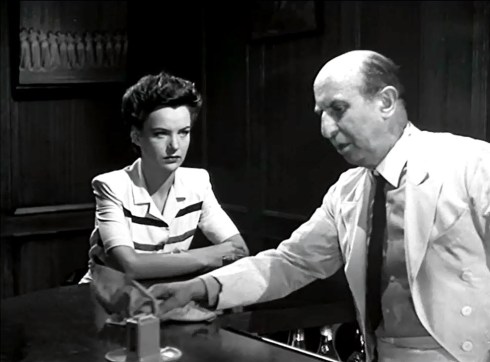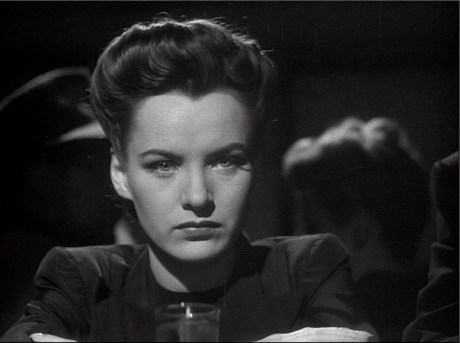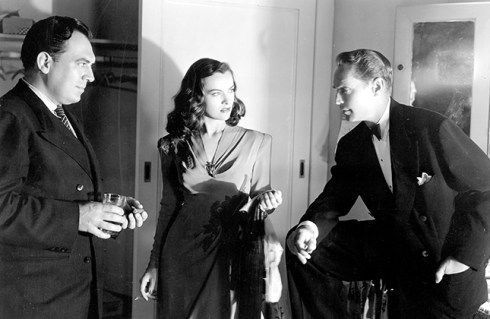Read: Parts Two, Three & Four
“A man could spend the rest of his life trying to remember what he shouldn’t have said.”- Force of Evil
“All that Cain did to Abel was murder him.” –Force of Evil
“He pushed me too far!… So I pushed him just far enough.” –The Lineup
“You’re like a rat in a box without any holes” – I Wake Up Screaming
“From now on, no one cuts me so deep that I can’t close the wound.” – I Wake Up Screaming
“I’m gonna give you a break. I’m gonna fix it so you don’t hear the bullets!”- The Big Combo
“I was born on a Monday, I might as well go out on a Monday. Like dirty laundry.”- Man in the Dark
Heads up… this feature includes spoilers…💣
1-I Wake Up Screaming 1941

I Wake Up Screaming is the first official noir produced by Fox, directed by H. Bruce Humberstone (he worked on Charlie Chan programmers and B-movies) who was not considered a noir director. With a screenplay by Dwight Taylor based on the novel by Steve Fisher. Eddie Muller said it personified film noir and calls the 1941 film – Proto-noir, as it was the first of its kind.
Darryl F. Zanuck wanted the film’s location changed to New York City, so it wouldn’t reflect badly on L.A. There are a number of sleazy characters involved and he wanted to shift the story from Hollywood to Broadway.
The film was remade as Vicki in 1953 (with Jeanne Crane and Jean Peters, though it lacked the highly stylized artistry) Photographed by Edward Cronjager (Seven Keys to Baldpate 1929, Hell’s Highway 1932, The Monkey’s Paw 1933, Island in the Sky 1938, The Gorilla 1939, Heaven Can Wait 1943, Desert Fury 1947, Relentless 1948, House by the River 1950, The Girl in Lovers Lane 1960) pours out murky noir shadows, darkened streets, unusual camera angles, low key lighting and the high contrast, one-point lighting that illuminates the ink black threatening spaces. The film is stark yet dynamic.

With music by Cyril J. Mockridge, you'll hear the familiar often-used noir leitmotif, the melody Street Scene by Alfred Newman. I Wake Up Screaming stars Betty Grable as Jill Lynn, Victor Mature as Frankie Christopher, Carole Landis as Vicki Lynn, and Laird Cregar as Ed Cornell. The film also co-stars Alan Mowbray as Robin Ray and Allyn Joslyn as Larry Evans. Quirky character actor Elisha Cook Jr. plays Harry Williams the desk clerk in Vicki’s apartment building who’s a real weirdo. William Gargan plays Detective Jerry ‘Mac’ MacDonald.
Cook is great at playing quirky oddballs (Cliff the crazed drummer in Phantom Lady 1944, George Peatty in The Killing 1956, anxious trench coat-wearing Wilmer in The Maltese Falcon 1941, Watson Pritchard in House on Haunted Hill 1959).

I Wake up Screaming bares a resemblance to a whodunit, as the killer is chased down with the story playing a bit of a shell game with us. There are common noir themes of obsession, perverse lust, corruption, and homicidal jealousy. The film also has a preoccupation with images and artifice, tossing up flashbacks like a circus juggler.
Right before model, Vicki Lynn heads to Hollywood to reach for her rising star, she is brutally murdered. Delicious Betty Grable in her first non-music role, plays Jill Lynn, Vicki’s sister, who is drawn to the man (Victor Mature) who is presumably her sister’s murderer.
Vicki functions as an essential part of the narrative early on in the film and is resurrected by way of flashbacks. Frankie knows that while there are images that still exist of Vicki she is no longer present. In fact, Vicki is a myth and a manufactured deception in some ways. Jill on the other hand is genuine, unpretentious, and warmhearted.
Carol Landis who died at 28 from an overdose, plays murder victim Vicki Lynn. I Wake up Screaming backflips into the weeks leading up to her death. The film is also somewhat of a noir variation on Pygmalion, as Victor Mature who plays Frankie Christopher, sports and show business promoter, discovers a beautiful girl waiting tables and gets the hot idea of turning Vicki into a celebrity and society girl. Vicki’s appeal is the sphere of influence that drives the plot. Mature always makes the screen sweat with his sexy brawny build, swarthy good looks, strong jaw line, and the aura of his glistening obsidian hair.

The film opens with a sensational news headline ‘MODEL MURDERED’ Right from the top Frankie is being grilled by the cops in the interrogation room. Burning white hot lights are up close in his face. He says to the shadow of Cornell (Cregar) who's a bulky shadow shot with single source lighting) to his opaque figure, "You're a pretty tough guy with a crowd around.”

The flashbacks begin. Frankie goes back to the first time he meets Vicki at the lunch room on 8th Avenue while eating with Larry Evans (Alan Joslyn) and Robin Ray (Alan Mowbray). Vicki asks "Is that all?" Lary Evans says "No, but the rest of it isn't on the menu." She handles his come on, "You couldn't afford it if it was.” Frankie pours on the charm. He gets the notion to take Vicki and mold her into a celebrity. “You know I bet in 6 months I could take that girl and put her on top of the ladder." Mature and Landis worked together in One Million Years B.C.

Has-been actor Robin Ray (Mowbray) and ruthless gossip columnist Larry Evans (Joslyn) decide to get involved in developing Vicki Lynn’s mystique and cultivate her glamour on the road to fame. Of course, both men wind up having a yen for her. A cynical Ray (Mowbray) complains that all women are alike. Evans (Joslyn) tells him, “For Pete’s sake, what difference does that make? You’ve got to have them. They’re standard equipment.”
Frankie takes Vicki Lynn out into New York cafe society – All three schemers, the columnist, the washed-up actor, and Frankie, bring her to the cafe and make a big noise, grabbing the attention of Lady Handel (May Beatty) who invites them over to her table. In order to give the impression that Vicki will now be a new sensation, Larry Evans brags in front of the table, that he'll plug her In his column. They also think that it’ll help Vicki to get noticed if she’s seen on Robin Ray’s arm. The outing is a success. When they bring her home to her apartment building they meet the squirrely desk clerk Harry Williams (Elisha Cook), who takes his sweet time, getting up for Vicki. Frankie gives him a hard time after being so disrespectful. Williams sneers, “She ain’t nobody.”




Back to the present and Frankie's still in the sweat box. They're questioning Jill too. She’s telling the cops about Vicki’s plans. She’s got, "Grand ideas about becoming a celebrity." They ask about Frankie’s involvement. Another flashback – the sisters are talking about Vicki’s new venture. Vicki tells Jill, "They're gonna glamorize me." Jill tells Vicki that she doesn't trust Frankie’s promises, and apologizes for sounding stuffy. She warns Vicki about having unrealistic aspirations. Flashback even further. Frankie shows up at the cafeteria. Vicki keeps dishing out the wisecracks. He shows her the newspaper article about her making a splash at the El Chico Club.
"Why all the cracks you don't even know me?" "I don't know anything about art, but I know what I like." Back in the present day, at the police station. Jill continues to tell the cops how successful Vicki's climb was. Backward once again-
Jill Lynn I don’t want to tell you your business, but don’t you think you’re making a fool of yourself?
Vicki Lynn What do you mean?
Jill Oh, this Frankie Christopher. People like that, what have they got to do with people like us?
Vicki Jill, they’re going to help me!
Jill In what way?
Vicki They’re gonna’ glamorize me. They may have started this thing as a gag, but, after taking one look at those million-dollar debutantes tonight, I realized I can give them cards in spades and still come out on top.
Jill Vicky, you’ll never come out on top by any shortcuts. One week your picture’s on the cover of a magazine, the next it’s in the ash can.
Frankie arrives at the girl’s apartment, and Vicki breaks the news to Frankie that she's going away to Hollywood. She'd done a screen test and signed a long-term contract. He's angry. She went behind Frankie's back after everything he did for her. She defends herself "Some people think I'm a pretty attractive girl. I'm no Frankenstein you know!" Frankie comments, "I wonder."
Jill tells the cops she was pounding a typewriter breaking her fingernails, and Vicki did get the Hollywood contract, so she might have been right about taking the risk with an acting career and becoming a star.
Another flashback The three men are sitting around the bar.
Robin Ray [indignant] Can you imagine her walking out on me, after all that I’ve done for her? Me!
Larry Evans [slightly incredulous] “You’ve” done for her? What have *you* done for her?
Robin Well, I took her out to all the bright spots, I let her be seen with me everywhere… It made her feel important.
Larry Why, you parboiled old ham! You don’t think anybody thought there was anything between *you* two, do you? If it hadn’t been for my plugging in the column, people would’ve thought she was your trained nurse.
Robin Why, you ink-stinking word slinger! I was famous when they were changing your pants 20 times a day!
Jumping to the present again, Jill is still being questioned by the cops. They want to know if Vicki had anyone in her life. Jill remembers a peculiar thing that happened. She tells them she was sitting at the table in the cafeteria waiting for Vicki to get off work. The peeping prowling, Ed Cornell's giant shape stares at Vicki through the window. He has a queer look on his face. Jill maintains her stare, holding her coffee cup, she is unable to put it down as she studies him, uncomfortably. Once he notices Jill catching him ogling Vicki, he skulks away. Mockeridge's score undergoes a sinister change, with emphasis on the rhythmic accents of a classic horror picture.

Jill tells her sister, "You seem to have an admirer there's some guy looking through the window like the wolf looking for the 3 little pigs." The girls are walking on the street, Cornell is leaning against a wall, and Jill points out to Vicki that he's the one. "He gives me the creeps," Vicki says, "You'll have to get used to that, they've got more wolves in New York than they have in Siberia," She tells the cops she saw him several times after in odd places. He never said anything but watched Vicki, it frightened Jill. There was something strange about him, the way he looked at Vicki. Always turning up in strange places. The cops look skeptical about her "mysterious stranger."

The cops think Jill is trying to protect Frankie "I just don't believe he did it, that's all" They ask if she's involved with him, and accuse her of being in love with him and wanting Vicki out of the way. Jill demands to see someone in authority, so they tell Mac to get Cornell. Who walks in? The creep who watched Vicki through the plate glass!
Enter rabid, self-righteous homicide Detective Ed Cornell (Cregar). Once he sets his sights on Frankie he begins to mercilessly hound him to the ends of hell if necessary, going after him with a flaming vengeance, trying to pin the murder on him. Cornell knows that Frankie is innocent but he is determined to persecute him. Cregar made an all too short career out playing imposing characters. He died at 28 in 1944 due to complications from a crash diet, always struggling with his weight, striving to obtain leading man status.
Jill is startled, the room is smoky and this massive shape looms over her with his girth "That's him, that's the man!" They think she's crazy. First, it's a mysterious stranger peeking through windows and now it's Ed Cornell. "That’s my job to look at people." Leaving the dark corner of the sweat box into the smoke factory with Frankie, things become more visible as Cornell emerges as a menacing force. She insists, "I did see you." “Alright Alright, I'm a peeping tom."

Jill Relates what happened on the car ride with Frankie, the night he learned Vicki was leaving, and she tells him he'll be glad to get rid of her because Jill is in love with him. Jill is just covering up her feelings. Frankie says Jill being in love with him, never entered his mind. Vicki is sure, "I know it's much deeper than that. That's why it’s so dangerous. Anything might happen."
Cornell writes down everything on his pad. Jill says that Vicki didn't mean the line about being glad to get rid of her, but he corrects her, “What she meant doesn't count. It's what she said.”

The night Jill found Vicki, as soon as she came out of the elevator she got a feeling something was wrong. There was music blasting from the radio. Frankie was there already – "Jill you don't think I did it, do you?" Jill is in shock.
Cornell goes back into the interrogation room with Frankie and tells him he knows about Vicki’s ‘get rid of me’ statement. The obsessed Cornell comes up with a scenario. Frankie’s mind got more and more inflamed with jealousy and hurt pride. Went up there and killed her in cold blood. Cornell loses his cool and lunges at Frankie, "I've got a mind to kill you right now."When Cornell gets rough, the other cops have to break it up. They all like Frankie and ask if he's got any tickets to the fights. They ask Cornell "What's the idea of riding him, so hard?” "I have years of experience in this racket. If that isn't the look of a guilty man, I'll take the rap myself." The District Attorney winds up getting his back up with Cornell when he focuses so much on Frankie’s guilt.

The District Attorney (Morris Ankrum) apologizes to Frankie. Jill is in the office too and tells him they think they know the identity of the killer. It’s the switchboard operator at the sisters’ apartment building. They think it’s Harry Williams. Jill leaves the police station and Frankie asks why they think it’s Williams. The D.A. tells him, William’s been missing since 5 pm last night, probably hiding out scared and shaky.
Frankie is released and later that night, Mature wakes up to find the huge, menacing Cregar sitting beside his bed, “Well that's the first time, I had a bad dream with my eyes open." “Someday you’re going to talk in your sleep, and when that day comes I want to be around.” The scene hints at Cornell’s repressed homosexual passion.
Cornell tells him he’ll get all the evidence he needs and tie him up like a pig in a slaughterhouse. Frankie unrattled, tells him, "You're the bright boy” and reminds him that they think Williams murdered Vicki. Victor Mature is so smooth, so mellow when he’s playing at being sarcastic, He says, "You're like something out of a museum you ought to have a magnifying glass and one of those trick hats with the ear flaps" Frankie throws Cornell out after he calls him cocky, and has had it his way too long. First with Vicki, then Jill. Cornell’s resentment is showing.
Jill finds Harry Williams who’s returned to the apartment building. She’s moving out, but he has already packed up her bags and taken them down to the lobby. Williams is a suspiciously hollow little insect who Jill finds strange. Frankie meets up with Robin at the police station. The cops show a reel of Vicki singing at a nightclub. Cornell watches her longingly which gives Frankie a window into Cornell’s longing for the dead girl. Cornell looks at Frankie with contempt.
The film of Vicki appears in the dark room filled with cigar smoke that makes wispy clouds float, and the rays of light from the projection booth. The light cast on Frankie's eyes is like an illuminated mask, it accentuates his epiphany "” that Cornell is obsessed with Vicki. He catches something in his stare. The light on Cornell’s face as HE stares back at Frankie, unmasks only half of his face, revealing the duplicity Cornell projects throughout the picture. It’s a brilliantly framed shot by Cronjager.

The film reel resurrects Vicki from the dead, like a ghost haunting the room. Robin Ray squirms in his chair and runs to get out. The door is locked. His behavior hints at his guilt. They put the lights on and bring him into the D.A.’s office. Ray tells them how he felt about her. She laughed at him. Called him "a has-been and didn't want to hitch her wagon to a falling star." He's the one that arranged the screen test but she went down there alone. He is obsolete, they decided they didn't need him. While he talks about her, Cornell looks out the window. Daylight casts patterns from the Venetian blinds that cut across his face. Odd angle profiles tilt the two-shot of Cornell and Mac off-kilter. Ray has an alibi. He was at a sanitarium. Cornell checked it out already and is gleeful that it rules out yet another suspect. He wants Frankie to fry for it. Cornell would have Frankie in the death house by now. “That won’t prevent you from going to the hot chair.”Â
As Frankie is leaving the police station Cornell asks him for a lift uptown "Sure, always happy to oblige a goon"
Ed Cornell [bumming a ride in Frankie’s car] “I’m sorry to have to ask you to do this, but I’m a little short on cash lately. You see, I’ve spent so much of my own dough, trying to build up this case against you.”
Frankie Christopher (Victor Mature) “Well, if there’s anything you need, just let me know.”
Ed Cornell “Oh, I imagine they’ll make it right with me when I bring in the material for your trial. They usually do in these cases. I nick a guy on my own time and send him up to the chair, then I get back pay.”
Frankie Christopher “Must be a great life – like a garbage man, only with people!”
Ed Cornell “I got practically all the evidence I need now. I could arrest you today for that matter, but you might get some smart mouthpiece and get off with life instead of the chair. I won’t be satisfied until I’m *sure* it’s the chair.”
Frankie Christopher “You’re a gay dog, Cornell. You make me feel as if I’m driving a hearse!”
Ed Cornell “Oh, I know your type. I’ve seen hundreds of them. I don’t scare you enough to make you commit suicide, but I worry you just the same. And when the day comes they all act different. Some scream, a few faint, some light a cigarette and try a wisecrack. But it sticks in their throats – especially when they’re hung.”
Cornell shows up at Jill's new apartment to intimidate her. Jill “What’s the good of living without hope?” Ed Cornell signals his own personal torture- “It can be done.” He advises her to just play along, insisting that she’s not even sure Frankie’s innocent. Once he’s left, Jill pulls out a note from behind a framed painting on the wall. It's from Frankie to Vicki, "After what you did last night, the sooner you're out of the way the better it will be."
Frankie takes Jill to the fights and then out on the town. She asks if he ever brought Vicki to the fights, and tells him it’s the first New York nightclub she’s ever been to. The El Chico club, he first took Vicki to. She sees how nice he is without all the flashy bluster and pretense. He's actually very real. Cornell follows them. Frankie asks her why she suddenly called him, "The trouble with you is that you pretend you don't care about things but you do. You were very upset about Vicki’s death weren't You? He tells her he'd like to find the guy, –“Save the State on its electric bill. She was a good kid” Jill doesn't want him to be guilty. "Did you love her?" “No, do you think if I'd loved her I would have tried to exploit her the way I did?… Vicki was pretty, gay, and amusing She had lots to offer and I wanted to put her in the right place on the map. After all, that's my business But when a man really loves a woman, he doesn't want to plaster her face all over papers and magazines. He wants to keep her to himself."
Looking into her eyes, he tells her he’s in love with her. Larry Evans sees them together and calls in the story "Stepping out"¦ Dancing on the grave."

Frankie takes Jill to his favorite swimming spot. It’s a lovely scene, that brings some lightness to the external space in the story. She shows him the note he wrote to Vickie and he asks why she didn’t turn it in to the police. Jill tells him she knew he was innocent and what the note meant, at the moment they were dancing at the nightclub. When they are back at the apartment, Cornell walks in and takes the note. They cuff Frankie. Cornell who is obviously framing him is just waiting for the chance to catch him. Frankie tells him anyone could have written a note like that. He was burned up when Vicki dropped the bomb that she was leaving. He finds out that Cornell has planted a set of brass knuckles in his apartment. Vicki was hit hard behind the ear with a heavy object. The depraved Cornell punches Frankie in the guts. "You're like a rat in a hole."
As Cornell is about to take him downtown, Frankie is on the ground after Cornell’s hostile assault, Jill hits Cornell from behind and helps Frankie escape. Big fat head bullying him, she says.
Frankie proposes, “Mind marrying a hunted man?” She tells him, "Most married men have a hunted look anyway." He tells her his real name – Botticelli, the son of Italian immigrants. Then he shows her how to hide in the city. They duck into an adult movie house, watching the same picture over and over. Then they decide to split up for the time being and she goes to the public library. The cops find her, and Frankie sees them taking her away. The newspaper headline says "Christopher eludes police dragnet." Cornell stalks the streets. Frankie sneaks up on him. "Let Jill go”, and he'll turn himself in. Ed Cornell (Laird Cregar) “I’ll follow you into your grave. I’ll write my name on your tombstone.” "You're not a cop you're crazy trying to frame an innocent man." Frankie throws a tootsie roll at him and takes off. Cornell assures him, he'll eventually get him. Always smirking like the devil.

Cornell tells the D.A. a parable about the African Butterfly and how to trap the male to set the female free. He wants him to let Jill out of her box to lure Frankie. She goes home, sneaks out through the window, and surprises Frankie at the adult movie house. At the apartment, she has found little cards from flowers that were sent to Vicki, and at the funeral. She shows them to Frankie. The message on the cards says, "Because I promised."
They go to Rosedale Cemetery and when he meets the caretaker, Frankie pretends to be a reporter and asks if anybody lately has been around Vicki’s grave. There were many flowers at the funeral, and the caretaker tells him that the grave's been getting flowers each day since she died. Frankie learns where they were sent from, and goes to Keating Florist. It turns out that Larry sent them. Frankie confronts Larry who admits he was with Vicki the day she died. He had promised to send her flowers every day when she left for Hollywood, and he wanted to keep his word. Larry winds up giving Frankie a clue about the killer, and he goes to the old apartment and gets Mac to give him a half hour. He has a strong hunch.


The next scene is ripe with atmosphere when Frankie leans against the wall in Vicki’s old apartment. The lattice shadows fence Frankie in. Harry Williams is sleeping at the front desk. Vicki rings the desk and speaks in Vicki's voice "Hello Harry, this is Vicki" He's visibly shaken. Frankie watches his reaction. His eyes open wider as the buzzing mocks him, "Harry this is Vicki. Why did you do it, Harry? Didn't you love me?" Frankie confronts Williams. “You let yourself in with your passkey and waited for her. You loved her. She panicked and screamed.” Williams admits, “I told the cop that when he chased me to Brooklyn. Cornell knew all along it was Williams. The dirty Cornell told him to just come back and keep his mouth shut. Mac hears the confession. Frankie tells him, he wants 5 minutes alone with Cornell.
He goes to his apartment and finds a perverse and macabre shrine to Vicki. Her image is like a talisman in his suffocating little apartment. He discovers the prominent photograph of Vicki in an elaborate frame. Cornell unaware that Frankie is there, comes in and places fresh flowers underneath the photograph, as an offering. Frankie watches then emerges, "You knew. Why'd you want to fry me?"He tells Frankie, "I lost Vicki long before Williams killed her. You were the one who took her away from me" Cornell wanted to marry her. Had this furnished apartment set up. Bought her perfume. “Til he came along and put ideas in her head. She thought she was too good for me. He could have killed him then.” Frankie puts it to him, "Why didn't ya?" "Cause I had the hook in your mouth and I wanted to see you suffer."
Cornell resented Frankie’s closeness to Vicki and inhabits a world that excludes him. In contrast to the suave Frankie Christopher, he is a lumbering and awkward outsider. To Cornell, Vicki will always be as unattainable as the first time he gazed upon her through the window. He was struck by her beauty, but she was completely and forever out of his reach. Cornell is like a lurking monster straight out of a classic horror movie. His uneasy presence lends to a surreal and menacing mood.

A Trailer a day keeps the Boogeyman away! I Wake Up Screaming (1941)
Continue reading “31 Flavors of Noir on the Fringe to Lure You In! Part 1”




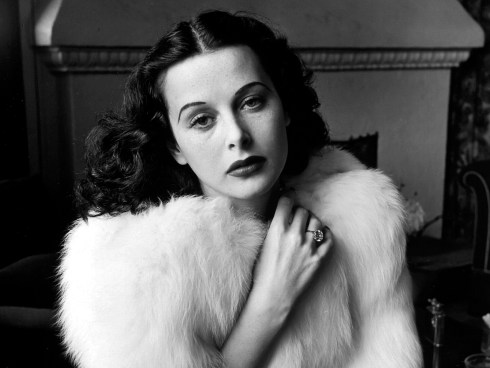







































































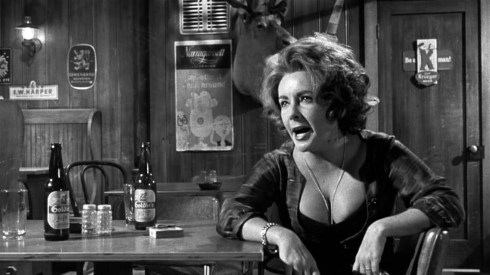











![Anna Lucasta (1958) | Pers: Eartha Kitt, Sammy Davis Jr | Dir: Arnold Laven | Ref: ANN040AE | Photo Credit: [ United Artists / The Kobal Collection ] | Editorial use only related to cinema, television and personalities. Not for cover use, advertising or fictional works without specific prior agreement](https://i0.wp.com/thelastdrivein.com/wp-content/uploads/2015/07/tumblr_lvnaeyvi341r1a8w8o1_500.jpg?resize=490%2C589&ssl=1)


















































































































































